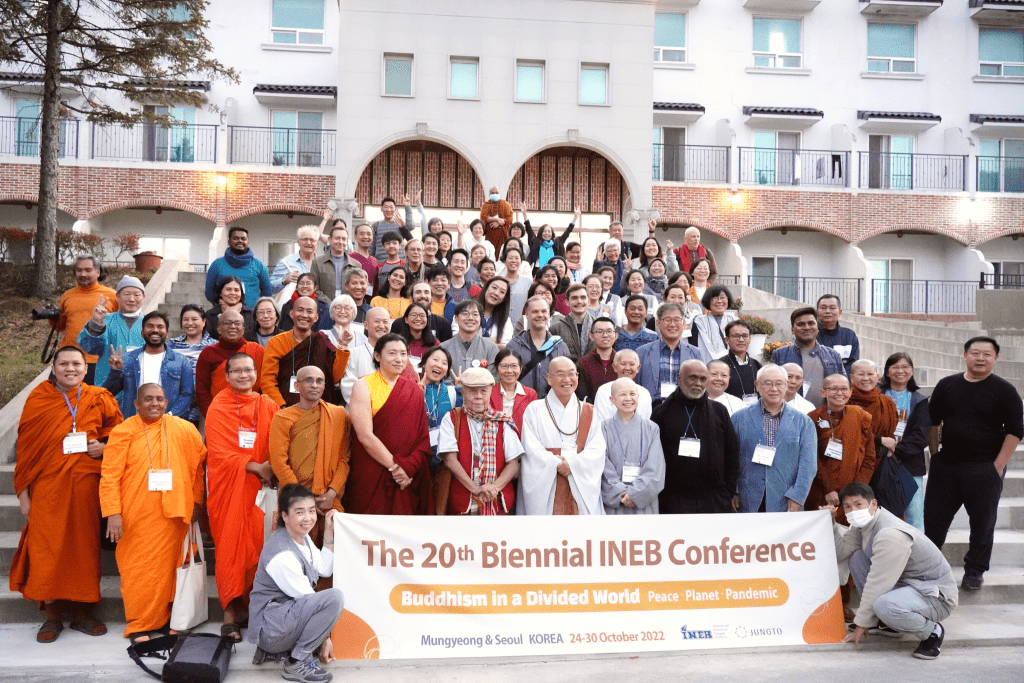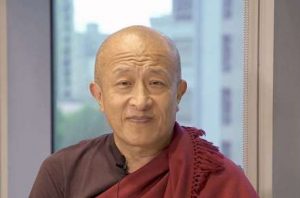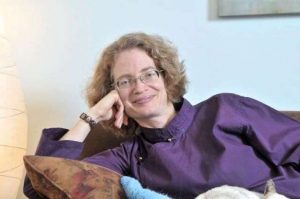
The 20th Biennial Conference of the International Network of Engaged Buddhists (INEB), jointly organized with and hosted by Jungto Society, was held in South Korea from 24–30 October under the theme “Buddhism in a Divided World: Peace Planet, Pandemic.”
The forum, which was divided between the autumnal mountain idyll of Mungyeong in the south of the Korean Peninsula and the 21st century metropolitan bustle of Seoul, brought together almost 100 speakers and attendees, members of INEB from around the world, along with INEB founder and renowned social activist Sulak Sivaraksa and Ven. Pomnyun Sunim, the founder of Jungto Society and Patron to INEB. The speakers included distinguished teachers, scholars, and prominent engaged Buddhist activists, who presented, examined, and discussed a wide array of topics that broached the core themes of the roles and obligations of engaged Buddhists in today’s divided and troubled world.
Among the notable speakers who presented at the week-long forum was Harsha Navaratne, the chairperson of INEB’s executive committee.
Harsha has been Sri Lanka’s high commissioner to Canda, based in Ottawa, since 2021. His commitment to peace, development, the arts, and cultural and religious pluralism can be seen throughout his life’s work. Harsha is the founder and chairperson of the Sevalanka Foundation in Sri Lanka, a leading NGO that works to empower disadvantaged rural communities, as well as an executive member of the Advisory Board to the United Nations Peace University (UPEACE).
Harsha’s keynote speech “The Role of Spirituality and Faith in a Divided World,” which he presented at INEB’s public “Roles of Spirituality & Faith in a Divided World,” held in Seoul on 29 October, is reproduced here in full.
Today, we need to address the future. Not with prayers prompted by fear, but by taking realistic action founded on scientific understanding. The inhabitants of our planet are interdependent as never before. Everything we do affects our human companions, as well as innumerable animal and plant species.
(His Holiness the Dalai Lama’s COP 26 message, 31 October 2021)
When we look at the world today, we see a crisis that we never imagined or expected. In order to limit the consequences and damage, we all need to work together in great cooperation and solidarity. We need to find a path toward personal awakening in order to come out of the present suffering as a society that leads to a safer, harmonious, happier and greener world. We need to act and recognize the importance of humanity’s sense of oneness, our interconnectedness that links every human being as a part of us. Spirituality plays a big role in making that a reality, as well as taking ownership to care for our common future.
The challenges we face today are immense. The world is divided. Internal conflicts among ethnic groups and communities, wars fought between nations, hunger, drought, climate change, ocean pollution, degrading natural resources, exploitation by multinational companies, media domination and manipulation, citizens’ distrust of democracy, tyrannical regimes taking dominion over nations, and so on, are all contributing to this current crisis.
Since we, as human beings, are responsible for creating these issues, it is also our responsibility to confront and address them. It is time that we came together at the global level to understand and commit ourselves to address these issues in ways that bring future benefits. First, we must individually be responsible for finding solutions to these issues and carrying the message to the greater society, which creates hope for the future.
I have spent the last 45 years of my life as a development practitioner. My journey began as a volunteer in a rural village in Sri Lanka, bordering a jungle, far from the city. During my time as a development worker in my country, I have witnessed tragedy after tragedy, whether manmade or due to natural causes. I have experienced the loss of friends and colleagues, who while seeking to make social change, lost their lives in the process. Some of them were even labeled as terrorists by the ruling regimes, although considered heroes by the common people. Unfortunately, heroism and politics in my country are such that, ironically, a person can be called either a hero or a terrorist depending on how you feel or wish. This may not necessarily be based on facts or justifiable reasoning. Under the guise of democracy, political parties create divisions and destroy the very fabric of social and moral values and ethics. They are responsible for pushing a country into desperate conditions resulting in an economic crisis and continuous human suffering.
Many people ask me: “How is it possible for Sri Lanka as a predominantly Buddhist country to go through such violent times, one after the other?” I have also often asked myself this difficult question.

During my childhood, our whole village community used to live as one big family. The village temple was the central place, the heart of my community. When the temple bell rang, we would all come together at the temple preaching hall. I had never seen police officers present in the village. The first time I saw a police officer was when I left my village and went to a boarding school in the city. The village was full of life and thrived on the values of cooperation, coexistence, shared resources, and solidarity. Living around the temple we learned to live this way, and the monks were our gurus. Unfortunately, as time passed, politics entered the temples and the community started to be more dependent on politicians. Some of the Buddhist monks who were spiritual masters also started to follow political trends rather than their own faith and value system.
The Lord Buddha’s teachings that promoted unity and oneness within one’s village, society, and country, started to fall apart. When society started to divide itself by ethnicity, religion, and political beliefs, disaster after disaster followed. Most of you may understand this, and may have experienced similar historic events and recollections.
Today we live in a society in which many of us contradict and violate its spiritual teachings and ethical or moral foundation. This has created a huge challenge for civil society activists and true social movements in countries such as ours. People are moving away from moral and ethical values in their search for quick-and-easy answers to existing socio-political issues.
It is important to seek the best method to practice what we preach and what we believe believe will stimulate social awakening. Do our politicians, leaders, preachers, practitioners, and “do-gooders” really practice what they preach? It’s hard to say “yes” to that question. Sometimes those recognized as spiritual gurus, preaching to a large group, are also responsible for breaking down society and contributing toward the ongoing negative trends through their teachings. It is, in fact, a real challenge these days to identify authentic, sincere, and truthful personalities. So what should be the role of a true leader of the people?
A true leader needs to be 100 per cent committed toward the common good, and to advance gradually and genuinely toward social and national goals, based on our values. He or she needs to move forward with like-minded people, with understanding, with a clear world view, and with the right set of attitudes. Great importance must be given toward setting long-term goals and having the readiness to face challenges, all the while remembering that it will be a long haul. A true leader must also be prepared to “practice what he or she preaches,” so as to be an example and role model to others.
As activists too, we need to understand the challenges we face, discuss them, and continuously shared them with our peers. I come from a country where bad planning, mismanagement, corruption, and huge debt issues have brought the country’s economy down to the ground. This, along with complicated social issues, has driven the country close to bankruptcy, and that has resulted in increased human suffering. Today, people are on the roads asking for systemic change. Policymakers need to plan and implement comprehensive reform programs, including democratizing structures.
Many do not understand that the last 74 years of party-based politics are responsible for the present situation in Sri Lanka. Doing away with the democratic parliamentary systems and adopting a centralized executive presidency where the majority leaned toward nationalism, while ignoring the needs and voices of the minority, has seriously damaged and destroyed the country’s vibrant social fabric.
As social activists, therefore, we demand de-centralization of executive presidential powers as also essential constitutional changes based on legitimate good governance for the common good.
A community such as ours, that is the International Network of Engaged Buddhists, needs to look at our respective countries’ past, present and future. This includes mainstreaming our engaged Buddhist values and putting those values into practice to benefit society as a whole. As Thich Naht Hanh said:
Even the most painful and violent experience of life demands our full attention. When we are attentive to our own suffering, we will know that of others. That knowledge can help break cycles of suffering and violence in the world around.
In essence, he teaches us to live “in peace and mindfulness.”
Mahatma Gandhi said: “my life is my message,” and Martin Luther King’s example of the great non-violent demonstration of the civil rights movement in the United States influenced Ajahn Sulak Sivaraksa to call them his spiritual kalyana-mitta [Pali. spiritual friend] from different parts of the world.
INEB was given birth in Ajahn Sulak’s ancestral boat house among a diverse meeting of kalyana-mitta, which is a significant historic event for all of us. Ajahn Sulak and his co-founders created this network, which has expanded immensely today. The solid foundation they built has formed a strong network that is resilient and able to confront challenges and differences such as religion, ethnicity, and geographical distances.
On the 90th birthday of Ajahn Sulak, we will all remember him as the greatest upasaka [Pali. lay practitioner] during our times, who honored and served Buddhist percepts and practices with utmost devotion. He now looks to our younger generation to follow his path and take INEB toward a prosperous future.

See more
International Network of Engaged Buddhists (INEB)
2022 Public Symposium | Seoul, Korea (INEB)
The 20th Biennial INEB Conference in South Korea (INEB)
Jungto Society
Jungto Society International
Related news reports from BDG
Engaged Buddhism: 20th Biennial INEB Conference Concludes in South Korea with a Commitment to Action, Peace, and Change
Engaged Buddhism: 20th Biennial INEB Conference Commences in South Korea
Engaged Buddhism: INEB to Host Public Symposium: “Roles of Spirituality & Faith in a Divided World”
Engaged Buddhism: INEB’s SENS 2023 Transformative Learning Program to Commence in January
Engaged Buddhism: INEB Launches Sangha for Peace to Tackle Regional Religious and Ethno-Nationalist Tensions
INEB, Clear View Project Launch Humanitarian Appeal for Buddhist Monastics in Myanmar
Related features from BDG
Engaged Buddhism in a Divided World: Declaration for Peace at the Korean DMZ
Peace, Planet, Pandemic, and Engaged Buddhism: From a Divided Myanmar to a Divided World
Ven. Pomnyun Sunim: Buddhism in a Divided World
Compassion and Kalyana-mittata: The Engaged Buddhism of Sulak Sivaraksa
Related videos from BDG YouTube
INEB Public Symposium: Roles of Spirituality & Faith in a Divided World – 29 October 2022
20th Biennial INEB Conference: Opening Session, Mungyeong, South Korea – 27 October 2022
INEB: The World at Risk – Engaged Buddhism in a Divided World














